SEAN Chanmony
Research Associate (On Study Leave)
SEAN Chanmony graduated a MSc. in Regional and Rural Development from Asian Institute of Technology, Thailand. Through his strong interest in doing research, he has been working in this field for some non-governmental organisations. Before working in CDRI, he worked as a research assistant involving in various research projects ranging from migration, nutrition, and gender.
Email : Chanmony@cdri.org.kh
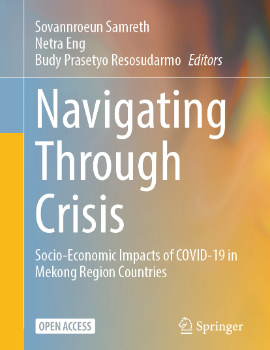
The COVID-19 pandemic significantly impacted Cambodia’s economy, leading to a contraction of -3.1% in 2020, with sharp declines in the service and industry sectors. Cambodian businesses, particularly small and medium enterprises, faced considerable turmoil while already grappling with challenges. This study examined firm performance—including expen...

This paper explores the factors affecting firms’ perception on how important barriers to innovation are in the case of Cambodia. In particular, the study aims to bring the characteristics of Cambodian enterprises to the fore, shedding light on two issues: what the characteristics associated with firm’s perceptions of barriers to their economic an...

Migration forces rural people to find more and better jobs, which is key in generating incomes to sustain livelihoods and ensure food security in times of environmental change. In addition to agricultural production, climate change affects health, water, and energy resources and causes migration and conflict. The impacts of climate change on me...
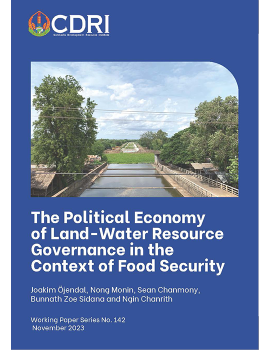
This study explores the political economy of land and water resource governance in Cambodia’s Tonle Sap floodplains, a region vital to national food security and rural livelihoods. Through desk research and stakeholder interviews, the report examines how governance structures, institutional frameworks, and actor dynamics shape resource management o...
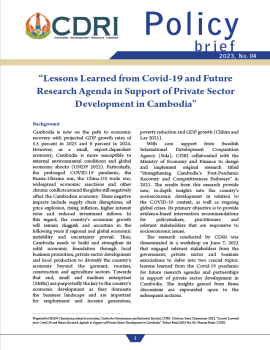
Cambodia is now on the path to economic recovery with projected GDP growth rates of 5.5 percent in 2023 and 6 percent in 2024. However, as a small, export-dependent economy, Cambodia is more susceptible to external environmental conditions and global economic shocks (UNDP 2022). Particularly, the prolonged COVID-19 pandemic, the Russia-Ukraine war,...
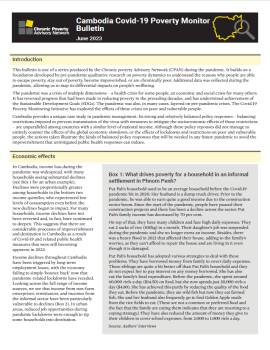
This bulletin is one of a series produced by the Chronic poverty Advisory Network (CPAN) during the pandemic. It builds on a foundation developed by pre-pandemic qualitative research on poverty dynamics to understand the reasons why people are able to escape poverty, stay out of poverty, become impoverished, or are chronically poor. Additional da...
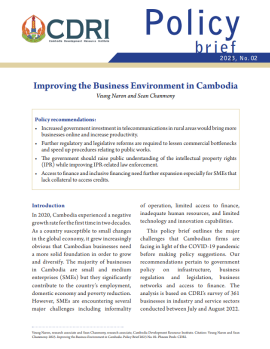
In 2020, Cambodia experienced a negative growth rate for the first time in two decades. As a country susceptible to small changes in the global economy, it grew increasingly obvious that Cambodian businesses need a more solid foundation to grow and diversify. Most businesses in Cambodia are small and medium enterprises (SMEs) but they significantly...
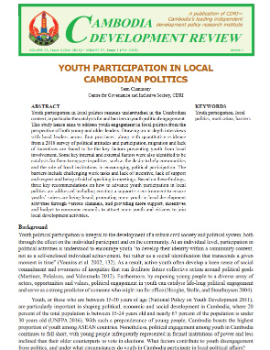
Youth participation in local politics remains understudied in the Cambodian context, in particular the catalysts for and barriers to youth political engagement. This study hence aims to address youth engagement in local politics from the perspective of both young and older leaders. Drawing on in-depth interviews with local leaders across four provi...
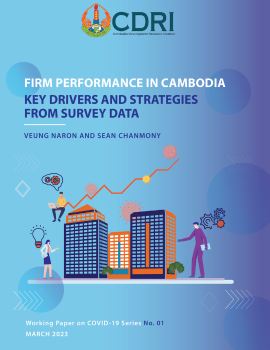
In early 2020, Covid-19 caused a global health crisis which drastically limited human interactions and economic activities both within and across borders, disrupted global supply chains, and resulted in economic slowdowns in countries around the world. Cambodia is no exception in this pandemic era. Cambodia registered a negative economic growth...
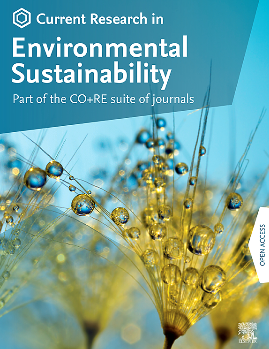
Many rural communities in the Lower Mekong region are vulnerable to the climate uncertainty induced by climate change due to high rate of poverty, lack of agricultural technology, and heavy reliance on the environment for their livelihoods. Rural people are likely to migrate to urban areas in response to the climate impacts and thanks to the rises...

CDRI research on decentralization and local governance reform showed that over the last 20 years, elected commune/sangkat councils have become among the most trusted and respected government institutions across Cambodia. Charged with both representing the government to the people, and representing the needs and desires of their constituents to high...
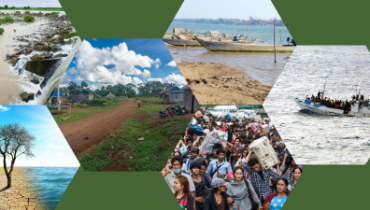
Links between climate change and migration in Cambodia need to be empirically substantiated. It is known that climate change poses a threat to agricultural production and impacts men and women in different ways in terms of a shift in employment, access to resources and assets, social norms and gender stereotypes, socioeconomic opportunities, and ad...
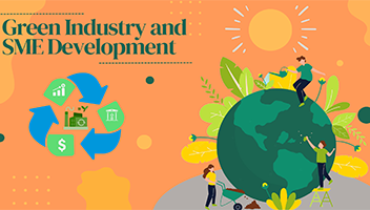
Green SMEs are small and medium-sized enterprises that operate environmentally and sustainably. In Cambodia, MSMEs (Micro-, Small and Medium-sized Enterprises) are the backbone of the economy and constitute more than 90 percent of firms in Cambodia. In 2018, MSMEs created over 70 percent of employment opportunities and more than 50 percent of the a...

PAGE is a joint initiative of the ILO, UNDP, UNEP, UNIDO and UNITAR. It was launched in 2013 to support countries in building economies that are environmentally sustainable. The initiative leads and assists partnering countries in their transition to an inclusive green economy. Cambodia is one of PAGE's partnering countries. With financial support...
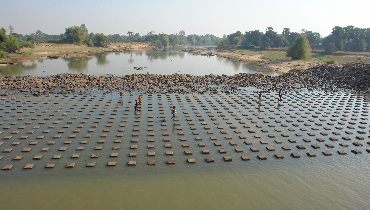
The Asian Mega Deltas (AMD) program is one of the new OneCG initiatives that commenced in April 2022 and will run till at least 31 December 2024 (Phase 1). The One CG involves closer working modalities amongst the numerous CG Centers to provide more coordinated and integrated support to governments and civil society in pursuing more productive, div...
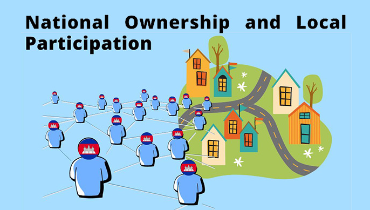
This research project investigates the inter-relation between national ownership and local participation. The working hypothesis is that these two concepts cannot and should not be conflated as often is the case in the development discourse. Though the implications of national ownership are disputed, it has turned into a main dogma in development a...
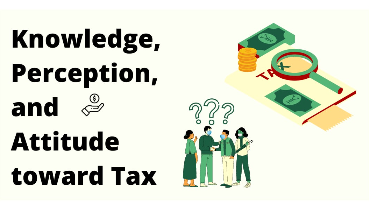
Cambodia is a developing country where tax revenue is the fundamental source for government revenues. Tax receipts account for about 67.45 percent of total government income (Ministry of Economy and Finance, 2016). The Ministry of Economy and Finance (2014) states that a revenue-mobilization policy is necessary to transform the country from its cur...
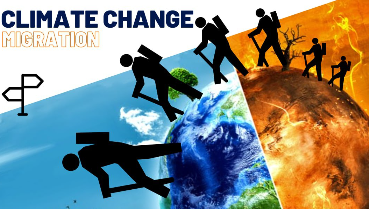
Efforts to address climate change, migration, and security are contextualized by the inclusion of migration concerns in the negotiation and policy processes under the United Nations Framework Convention on Climate Change (UNFCCC). So far, according to Elliott (2012), migration concerns were conspicuously absent from formal UNFCCC agreements and dec...

Over the last 20 years, the Kingdom of Cambodia has made remarkable progress in creating an enabling environment for business and investment, making the country favourable for foreign direct investment (FDI) in the region and creating commercial and export opportunities for local businesses. With this favourable business environment, Cambodia achie...
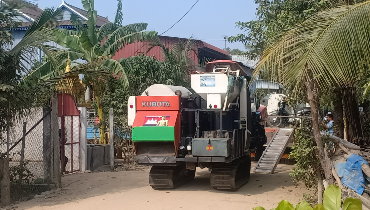
Financial markets have recently transformed agrarian landscapes throughout Southeast Asia. Smallholder farmers have gained access to formal financial technologies—such as microcredit, insurance, and mobile banking—to capitalize agricultural production and manage their risks. Proponents of finance argue that these new markets will promote economic g...
